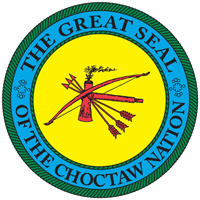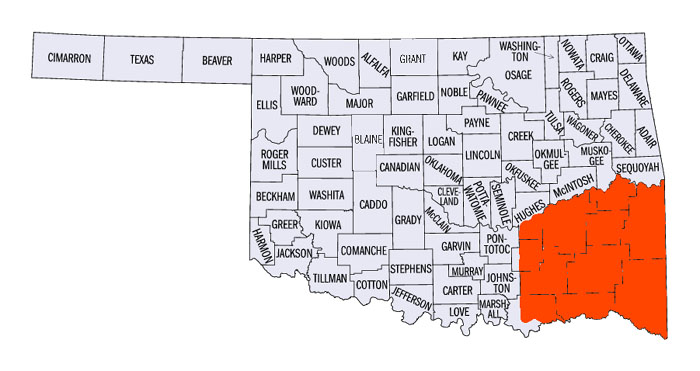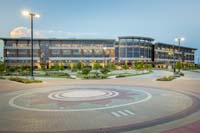 |
 |
The Choctaw
Capitol Building is
a historic building built in 1884 that housed the government of the Choctaw
Nation of Oklahoma from 1884–1907. The building is located in Pushmataha
County, Oklahoma, two miles north of Tuskahoma.
The site also includes the Choctaw Nation Council House and the Old Town
Cemetery of Tuskahoma.
After several decades of constitutional
experimentation, during which the Choctaw Indians moved their national
capital among several locations, the National Council in 1883 authorized
construction of a permanent seat of government at Tushka Homma. The name
means “home of the red warrior” in the Choctaw language, and its
spelling has since been standardized as Tuskahoma.
The Capitol was completed in September 1884,
built of red native brick, sandstone, and nearby timber for $30,000.
In the fall of 1884 the Indian Journal at Muskogee, Indian
Territory wrote, “The capitol building is the finest structure in the
Territory…”
Inside the Capitol were rooms for the Senate, House of Representatives, Principal Chief, Supreme Court, and constitutional officers, including the National Attorney and National Auditor.
The Capitol was in use from 1884 until 1907,
when the Choctaw Nation was abolished, and Oklahoma became a state.
After statehood the building fell into disuse and disrepair. However,
the Capitol was restored in 1972 and has achieved new life as the
national museum of the successfully reconstituted Choctaw Nation, whose
executive offices are now located in Durant, Oklahoma.
A Choctaw war veterans' memorial is on the
Capitol grounds. It includes a special section in tribute to the
famous Choctaw Code Talkers, who pioneered the use of Native American
languages as military code. Their initial exploits were during World War
I and were repeated by Choctaws and additional tribes during World War
II.
The Capitol is listed on the National Register
of Historic Places.
.jpg) |
.jpg) |
.jpg) |
.jpg) |
.jpg) |
.jpg) |
.jpg) |
.jpg) |
.jpg) |
.jpg) |
.jpg) |
.jpg) |
.jpg) Early Choctaw Council House |
.jpg) 1884 Council House Undated Photo |
 Choctaw Tribal Headquarters Complex in Durant |
.jpg)